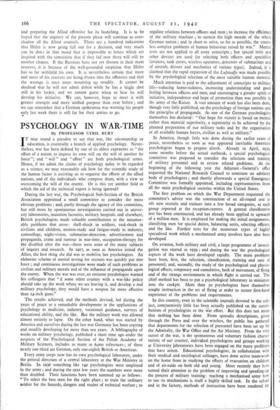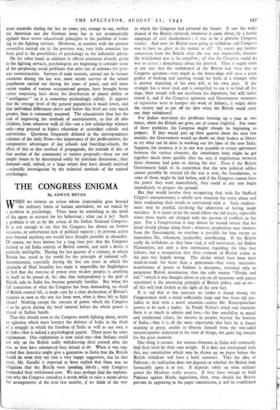PSYCHOLOGY IN WAR-TIME
By PROFESSOR CYRIL BURT
IT may sound a paradox to say that war, like salesmanship or education, is essentially a branch of applied psychology. Never- theless, war has been defined by one of its ablest exponents as " the effort of a nation to impose its own will on the will of another by force "; and " will " and " effort " are both psychological terms. Hence, if we admit the claims of psychology today to be regarded as a science, we may reasonably ask how far the scientific study of the human factor is assisting us to organise the efforts of the allied nations, and of the individuals who compose them, with a view to overcoming the will of the enemy. Or is this yet another field m which the aid of the technical expert is being ignored?
During the last war, the Psychological Sub-Section of the British Association appointed a small committee to consider the more obvious problems ; and, partly through the agency of this committee, but still more by spontaneous investigations carried out in univer- sity laboratories, munition factories, military hospitals and elsewhere, British psychologists made valuable contributions to the innumer- able problems that arose: shell-shock in soldiers, raid-shock in civilians and children, motion-study and fatigue-study in industry, camouflage, night-vision, submarine-detection, advertisement and propaganda, crime and rumour in war-time, occupation-therapy for the disabled after the war—these were some of the many subjects of inquiry and research. In 1917, as soon as America joined the Allies, the first thing she did was to mobilise her psychologists. An elaborate scheme of mental testing for recruits was quickly put into force ; and continuous investigations were made of_such problems as civilian and military morale and of the influence of propaganda upon the enemy. When the war was over,. an eminent psychologist warned his colleagues that " if some other country with a war-like policy should take up the work where we are leaving it, and develop a real military psychology, they would have a weapon far more effective than 14-inch guns."
The results achieved, and the methods devised, led during the years of peace to a remarkable development in the applications of psychology to medicine, industry, vocational guidance, surveys of educational ability, and the like. But the military work was allowed almost entirely to lapse. On the other hand, what was started by America and ourselves during the last war Germany has been copying and steadily developing for more than ten years. A bibliography of works on military psychology, published a short time ago under the auspices of the Psychological Section of the Polish Academy of Military Sciences, includes as many as 6,000 references ; of these nearly one-third are German, only one-eighth British or American.
Every army corps now has its own psychological laboratory, under the general direction of a central laboratory at the War Ministry in Berlin. In 1936 something like 140 psychologists were employed in the army ; and during the next few years the numbers were more than doubled. Their functions have been summed up as follows: "To select the best men for the right place ; to train the ordinary soldier for the hazards, .dangers and strains of technical warfare ; to regulate relations between officers and men ; to increase the efficiency of the military machine ; to sustain the high morale of the whole German nation ; and in short to solve, so far as possible, the count- less complex problems of human behaviour raised by war." Mental tests are not applied to all army conscripts ; but special tests and
other devices are used for selecting both officers and specialists (aviators, tank crews, wireless operators, detectors of submarines and of aircraft, drivers and mechanics of various types). Indeed, it is claimed that the rapid expansion of the Luftwaffe was made possible by the psychological selection of the most suitable human material.
Much attention is paid to the adjustment of conscripts to military life—reducing home-sickness, increasing understanding and good feeling between officers and men, and encouraging a greater spirit of initiative, independence and hope of promotion than was possible in the army of the Kaiser. A vast amount of work has also been done, though very little published, on the psychology of foreign nations and the principles of propaganda. As one of the German psychologists themselves has declared : " Our hope for victory is based on mental rather than material superiority, a superiority to be achieved by the planned preparation of our military tasks and by the organisation of all available human forces, civilian as well as military."
In America, though little was done during the earlier years of peace, nevertheless so soon as war appeared inevitable American psychologists began to prepare afresh. Already in April, 1939, some months before the actual outbreak, a special psychological committee was proposed to consider the selection and training of military personnel and to review related problems. At the beginning of the following year the Adjutant - General's office requested the National Research Council to nominate an advisory body of psychologists ; and shortly afterwards a special Emergency Committee was formally appointed, including representatives from all the main psychological societies within the United States.
The first problem on which the War Department requested the committee's advice was the construction of an all-round test to sift new recruits and trainees into a few broad categories, as each group reported at the reception-centres. A general clasification test has been constructed, and has already been applied to upwards of a million men. It is employed for making the initial assignments. classifying men for special duties, balancing units, selecting officers. and the like. Further tests for the numerous types of- highly specialised work which a mechanised army involves have also been developed.
On aviation, both military and civil, a large programme of investi- gation was started in 1939 ; and during the war the psychological aspects of the work have developed rapidly. The main problems have been, first, the selection, classification, training and care of personnel; and, secondly, the study 'of the psychological and physio- logical effects, temporary and cumulative, both of movement, of flying and of the strange environment in which flight is carried out. The chief method has been to put a psychological laboratory in miniature into the cockpit. More than 5o psychologists have themselves sought instruction in the art of flying in order to secure first-hand experience of the problems and requirements.
In this country, even in the scientific journals devoted to the sub- ject, comparatively little has been actually published on the contri- butions of psychologists to the War effort. But this does not mean that nothing has been done. From sporadic descriptions, given through the Press and over the wireless, the public has gathered that departments for the selection of personnel have been set up by the Admiralty, the War Office and the Air Ministry. From the very outset of the war, 'n the spontaneous and voluntary fashion charac- teristic of our country, individual psychologists and groups working at University laboratories have been engaged on the many problems that have arisen. Educational psychologists, in collaboration with their medical and sociological colleages, have done active team-work on the home front in studying the effects of evacuation on children and of air-raids on both old and young. More recently they have turned their attention to the problem of improving and speeding-up the process of military training: teaching a mechanised army how to use its mechanisms is itself a highly skilled task. In the school and in the factory, methods of instruction have been rendered far
more scientific during the last 20 years; yet, strange to say, neither the American nor the German army has as yet systematically applied these newer educational principles to the problem of train- ing in the fighting services. Moreover, in contrast with the pioneer researches carried out in the previous war, very little attention has been paid to the possibilities of psychology in the industrial sphere.
On the other hand, in addition to official assistance directly given to the fighting services, psychologists are beginning to consider some of the perplexing social problems that arise out of schemes for post- war reconstruction. Surveys of male recruits, carried out in various countries during the last war, more recent surveys of the school population carried out during the years of peace, and still more recent studies of various occupational groups, have brought home rather surprising facts about the distribution of innate ability or " intelligence " (as it is somewhat misleadingly called). It appears that the average level of the general population is much lower, and that individual differences above and below this level are very much greater, than is commonly assumed. The educationist thus has the task of improving the methods of ascertainment, so that all able children, from whatever walk of life—not a few scholarship winners only—may proceed to higher education at secondary schools and universities. Questions frequently debated in the correspondence columns of the daily Press—the importance of the profit-motive, the comparative advantages of day schools and boarding-schools, the effect of this or that method of propaganda, the attitude of this or that section of the community to various proposals—these arc not simple issues to be determined solely by armchair discussion ; they demand—and, indeed, to a large extent they have already received —scientific investigation by the technical methods of the trained psychologist.



























 Previous page
Previous page